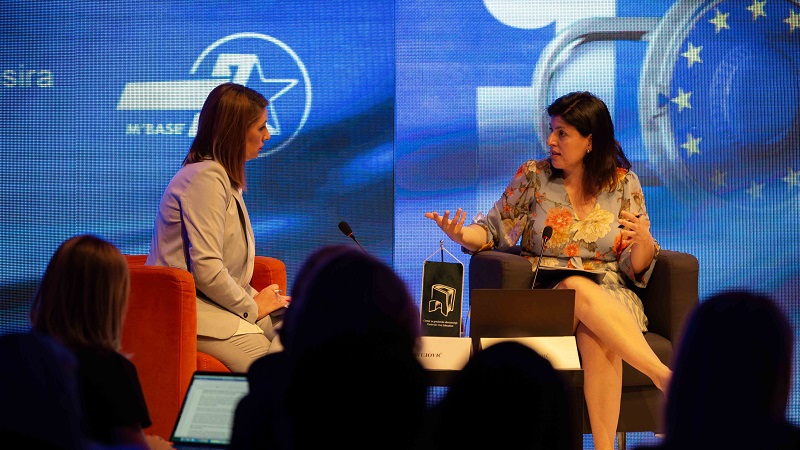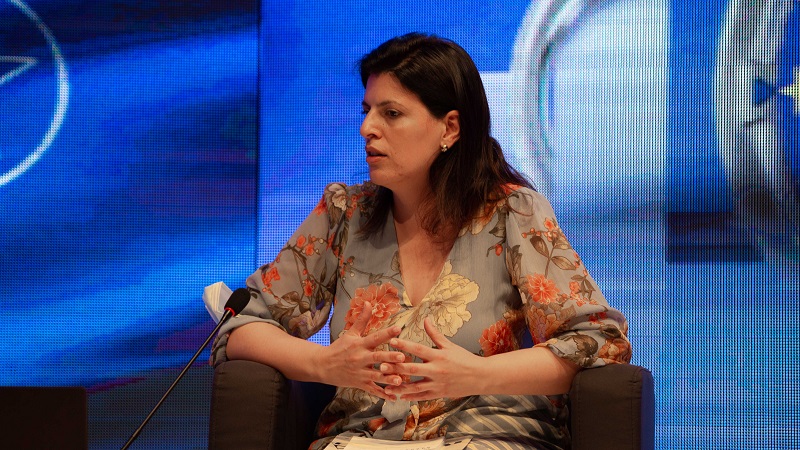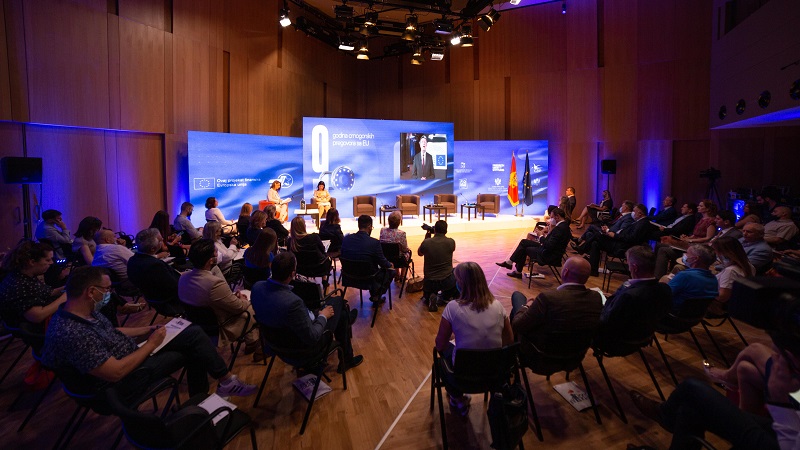‘’It is time to raise questions about how to go better, faster, more efficient in operational and technical terms, as well as how to build the inclusive dialogue we need in parallel, but we also need instruments on how to build cooperation”, stated Chief negotiator, Zorka Kordić, at the conference “Nine years of Montenegrin negotiations with EU’’.
At the panel “The regional and national perspective of membership in the European Union in light of the new methodology”, she said that the new moment calls for a higher degree of accountability of all stakeholders. As she said, the role of the Government and the negotiating structure is clear and now it needs to get a new impulse to adapt to the new methodology and to focus on priorities.
She pointed out that the transformative power of the process is unquestionable and that it is time for everyone to contribute to the process by acting from their domain. As she said, it is important to create new models of cooperation, use the capacities of everyone who wants to contribute to the process, think about how to improve the legislative framework and further upgrade the institutions of the system together in a practically and pragmatically.
Talking about the recent Intergovernmental Conference, Kordić stated that for the first time we have a high-level political dialogue, with the participation of the EU High Representative for Foreign Affairs and Security Policy, Borrell. ‘’The most important political messages have been exchanged, and this should be used as a trigger for deepening the quality of the process, which is primarily focused on the quality of life of citizens, and fundamental reforms in our society,” said Kordić.
“It was a format for demonstrating a strong political signal, not only by Montenegro, as a clear commitment that results in full compliance with the Common Foreign and Security Policy (CFSP) of the European Union. When it comes to member states, this format was an opportunity to give Montenegro a strong political signal of support for this process, not only to this clear geopolitical commitment of the state, but also to what represents the key proof of that commitment, and that is the political will for fundamental reforms of the rule of law” said the Chief negotiator.
Speaking about the obligations arising from Chapters 23 and 24, the Chief negotiator underlined that, according to assessments, 83 interim benchmarks within Chapters 23 and 24 were largely met, but that the remaining scope of tasks requires a strong focus of all institutions and clear guidance on what the remaining tasks are. “This area is a joint competence of a large number of stakeholders in the society. It is time for Montenegro to demonstrate that it is aligning with the EU value system. Therefore, it is difficult to quantify the remaining interim benchmarks that would lead us to the closing benchmarks”, she claimed.
As she stated, now we have a greater interest of member states in monitoring the progress in the rule of law, which can be a challenge as the subject of their assessment and consideration will be a political aspect.
“Accession negotiations, which I hope will be completed by the end of the mandate of this Commission, should be part of Montenegro’s democratic transition on its path toward the European Union. We hope that Montenegro will be able to overcome its political problems that burden the most vulnerable groups”, stated in a video message Tonino Picula, European Parliament Rapporteur for Montenegro.
He said that the EU provided strong financial support to the Western Balkans even during the COVID-19 pandemic. “Although the EU itself has been severely affected by the pandemic, it has not abolished resources but provided significant support to the Western Balkan countries in combating this imminent threat,” said Picula.
Picula added that considering the current perspective, the European Union continues to perceive the Western Balkans countries as partners. “Montenegro has been successful in the negotiations and fulfilled the preconditions, but it is very important to encourage participation to increase parliamentary accountability. Everyone must demonstrate accountability through democratic monitoring of the entire process, because the key requirements from the very beginning were achieving quality on the path toward EU membership “, he pointed out.
He deems that the Government has demonstrated compliance with the objectives of NATO and a desire to align with the EU Common Foreign and Security Policy (CFSP), and that NATO integration has already brought economic and security benefits to Montenegro, thus justifying the Alliance’s trust, while the EU has set clearly defined goals through the new Instrument for Pre-accession Assistance (IPA III) to carry out all necessary reforms.
“We believe that dissonant tones, which are heard from EU, are just a phase that will pass, and that Montenegro by strengthening its priorities will continue decisively to the European goal,” Picula concluded.
Dr Tanja Miščević, Deputy Secretary-General of the Regional Cooperation Council (RCC), pointed out that the new methodology is two-fold significant – it is required by the member states of the European Union and represents new energy for enlargement policy, and on the other hand, there is a precise determination and organization of negotiations with an emphasis on the fundamental issues that are crucial, i.e rule of law.
‘’The new methodology introduces long-sought innovations, inclusion into some of the EU policies even before the membership. The only significant innovation are clusters, which Montenegro already has through monitoring the course of accession negotiations conducted by its negotiating group”, Miščević said.
„Negotiations represent a marathon and a lot of work is even ahead of those who have been in the negotiation process for many years. I do not see this as a package deal, the European Union will adhere to the principle of advancement in relation to what has been done. It is difficult to assess who will be the next member of the European Union, as from the observing of the previous enlargement waves, we can conclude that nothing is guaranteed”, she added.
She emphasized that regional cooperation is important not only because of the fulfillment of obligations towards EU but also because of ourselves. “Common regional market, joint investments, research and development, digital and green agenda, are models of cooperation in the six Western Balkan countries (WB6). The purpose of that regional cooperation is to help and contribute to the process of European integration “, concluded Miščević.
The conference is held within the project “CSOs in Montenegro – from basic services to policy making – M’BASE” implemented by the Centre for Civic Education (CCE) in partnership with German Friedrich Ebert Stiftung (FES), NGO Politikon and NGO Center for Protection and Study of Birds (CZIP), in cooperation with the Ministry of Public Administration, Digital Society and Media and the Office for European Integration of the Government of Montenegro. The project is funded by the European Union.



